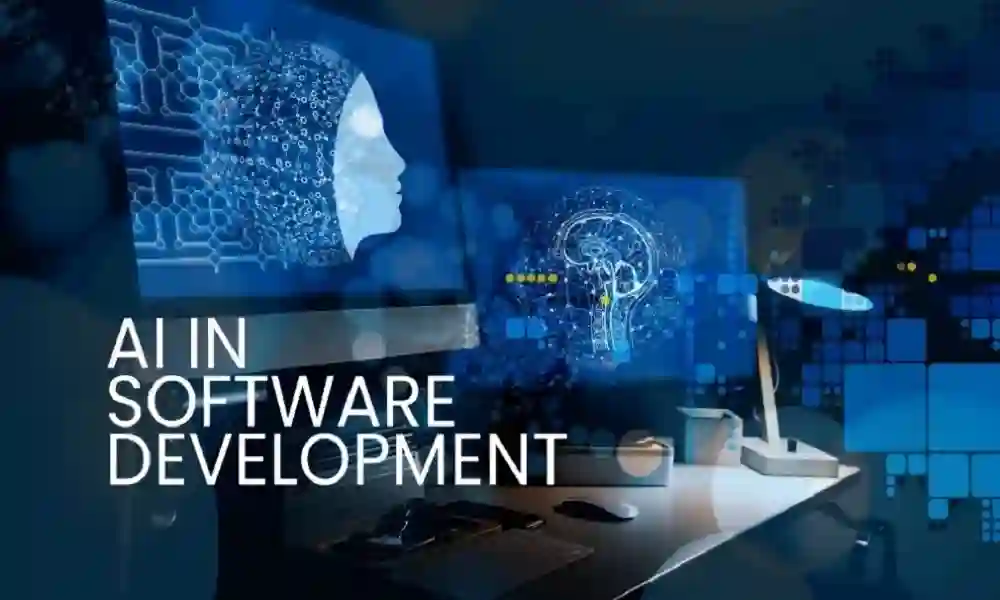The Role of AI in Software Development

Alright, here we go. The whole “AI in software development” thing sounds kinda high-tech and futuristic, right? At least, it did to me when I first heard about it. But honestly, it’s not as mysterious as it sounds. And it’s already happening—whether you’ve realized it or not.
I’ll be real with you: at first, I was skeptical. “AI writing code? Nah, no way.” But after seeing what these tools can do, I’m a convert. AI isn’t just some fancy buzzword. It’s a game-changer. If you’re in software development, or thinking about it, stick around. Here’s the lowdown.
The Rise of AI in Software Development
Remember when AI seemed like a crazy sci-fi idea? Like, we all thought we’d have robot butlers by now or whatever. But instead, AI quietly snuck in, not as some flashy thing, but as an assistant, helping developers make smarter decisions and faster code. And honestly? It’s a relief.
If you’re a developer like me (or even if you’re just someone who’s written a few lines of code), AI’s impact is undeniable. Think back to when you spent days debugging code that, in retrospect, should’ve been easier. Yeah, AI’s got your back on that.
I’m not saying AI is perfect—no way. It still has its kinks. But it’s definitely speeding up the process, making things more efficient, and helping with the stuff that used to drive me nuts.
How AI Changes the Software Development Game
Look, software development has never been a quick process. It’s not just about writing code—it’s about designing, testing, tweaking, and rethinking stuff over and over. AI is changing how we approach each stage of the development process. Here’s how.
- Planning & Requirements Gathering
- Gathering user requirements used to mean a lot of guesswork and tons of meetings. AI makes it easier by predicting what users might want based on data trends. It’s like you have a crystal ball. Well, a data-driven crystal ball. Anyway, more accurate, right?
- Developers can now prioritize features that have a better chance of success. I remember this one project where I worked with a team, and we spent months building features nobody wanted. AI would’ve spared us that agony.
- Coding and Design
- Alright, the dreaded coding phase. The AI tools I use now basically autocomplete my code. No more endless Googling for the right syntax or remembering obscure libraries. It’s like having a coding assistant who’s really into, well, everything I write.
- AI also helps with design. Have you ever tried designing an app UI and just stared at your screen for hours because you’re not really a designer? I have. AI can create intuitive wireframes and suggest better design patterns. Maybe it’s cheating, but hey, I’ll take it.
- Testing and Debugging
- This is the part I used to hate. Testing was like Groundhog Day. But now? AI runs thousands of tests in minutes. It can detect bugs before they even become a problem. One time, I found an issue in my code just by running an AI-based testing tool. Saved me hours.
- Oh, and AI can predict where your code might break. It’s like a weather forecast, but for bugs. Except the “storms” are coding errors, and I’m not stuck running around looking for an umbrella.
- Deployment and Maintenance
- Deployments used to feel like sending your app into a storm with no GPS. Now? AI monitors and gives real-time feedback on the performance. If there’s a bug after launch? AI catches it, usually before users even notice.
- I’ll admit, I’ve had a few… “unpredictable” launches. Let’s just say one time my deployment was as successful as my first attempt at baking bread (hint: it didn’t rise). With AI, those days are behind me.
So, Why Is AI a Big Deal for Software Development?
Speed. Accuracy. Efficiency. The kind of stuff that, as a developer, you’d sell your soul for (well, maybe not literally). But seriously, here’s why AI matters in the world of software development:
Speed and Efficiency
Let me tell you—AI is like an espresso shot for your workflow. It makes everything faster. Writing code? Faster. Testing? Faster. Debugging? Yep, you guessed it—faster. Instead of wasting time on menial tasks, AI helps you focus on what you actually want to do: building cool stuff. And I’ll admit it—AI can keep up with my procrastination habits too.
Remember that time I had a deadline in two days and I was still fixing bugs at 2 AM? Yeah. If I’d had AI doing the testing, maybe I wouldn’t have been so panicked. Maybe.
Reducing Human Error
Alright, no one likes to admit it, but we’ve all written code that looks like it was typed while half-asleep. (Guilty!) AI’s like that friend who’s always reminding you to put your shoes on before leaving the house. It catches the stuff you’d miss, whether it’s a syntax error or an issue with your database connection.
And I really appreciate that AI catches mistakes before I can make a fool of myself in front of my boss. My ego thanks it daily.
Collaboration Made Easier
Oh, the joys of collaborating remotely. Multiple time zones, different opinions, and somehow still managing to break the app in 14 different ways. AI tools, like GitHub Copilot, have helped me work smoother with teammates. They suggest code snippets, point out errors in real time, and make reviewing other people’s code feel less like a game of “find the bug.”
Must-Have AI Tools in Software Development
Alright, now we’re getting to the fun part. If you’re in software development, you’ve probably heard about these AI tools. But in case you’ve been living under a rock, here’s a rundown of the ones I use (and why you should too).
1. GitHub Copilot
- This tool is like a co-pilot for your code—hence the name. It auto-suggests code snippets based on what you’re writing, helping you avoid some of those head-smacking moments. Seriously, the number of times it saved me from copying and pasting the wrong function is mind-blowing.
- Once, I was stuck on a particularly nasty bug, and Copilot gave me a suggestion that turned out to be exactly what I needed. My code came alive like it was suddenly speaking to me.
2. Tabnine
- This one’s like the backup quarterback. It steps in with code suggestions when you’re not sure what to do next. It’s trained on thousands of examples, so you’re never really “lost” in your codebase.
- Fun fact: My first time using it, I thought it was some magic trick. Tabnine made my code seem way more efficient. It’s like having a secret weapon, but without the whole cloak-and-dagger vibe.
3. Test.ai
- If you’re tired of writing the same tests over and over, Test.ai is for you. It generates automated test cases based on your app’s functionality. Test cases you probably should’ve written, but hey, we all get lazy sometimes, right?
- Honestly, I used to dread test writing. Now, I’m like “Hey, AI, can you take care of that for me?” And it does. Beautifully.
But There’s A Catch…
Of course, AI has its flaws. I mean, who doesn’t? I remember the first time I tried an AI-based tool to write code—I swear, it gave me more bugs than I started with. So yeah, don’t expect miracles every time.
Plus, we have to be careful about bias. If AI is trained on bad data, it’s going to suggest bad code. And we don’t need that.
But at the end of the day, AI tools in software development are worth it. If used correctly, they’ll make you a better developer, and that’s what we all want, right?
Wrapping It Up
Anyway, here’s the kicker: AI in software development is like a well-timed coffee break during an all-nighter. It helps you do your job more efficiently, but it still requires your expertise to really get things done. It’s not perfect—but damn, it’s getting close.
I’m convinced that, in the future, AI is going to be a mainstay in every developer’s toolkit. Heck, it already is. So, embrace it. Just don’t expect it to do everything for you—remember, even AI needs a little guidance sometimes.







